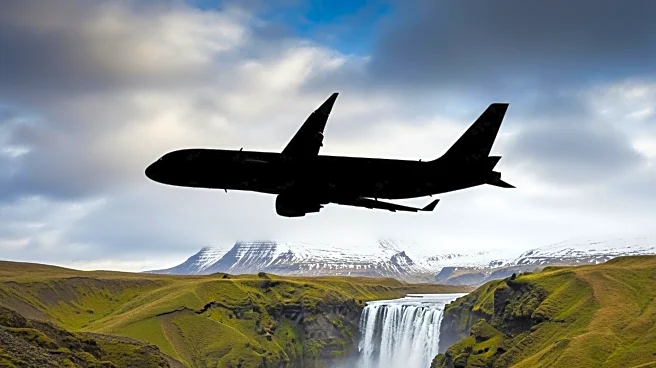What's Happening?
On September 29, PLAY, Iceland's major low-cost airline, ceased operations and canceled all flights immediately. The decision followed a series of events, including flight cancellations and strikes due to tensions between pilots and the airline. PLAY, formerly known as Fly Play hf., cited weak financial results, declining ticket sales, and internal conflicts as reasons for its closure. The airline's collapse is reminiscent of WOW Air's shutdown in March 2019, which left thousands of passengers stranded. PLAY's demise is expected to affect Iceland's tourism industry, although the impact may be less severe than WOW's collapse. Tour operators are revising offers and reducing prices to mitigate the effects.
Why It's Important?
The closure of PLAY airline is significant for Iceland's tourism sector, which relies heavily on air travel to bring visitors to the island. PLAY accounted for approximately 10-12% of foreign visitors, translating to around 220,000 travelers annually. The airline's shutdown adds uncertainty to Iceland as a destination, compounded by other factors like volcanic activity and exchange rate fluctuations. However, other airlines such as Icelandair, SAS, and Finnair are increasing capacity to fill the gap left by PLAY. The tourism industry and government are expected to collaborate on pricing and policies to continue attracting visitors.
What's Next?
Tour operators are adjusting their strategies in response to PLAY's closure. Companies like Traveo, Arctic Adventure, and Troll.is are offering discounts on tours to attract customers. The government and tourism sector are likely to engage in dialogue to stabilize the industry and maintain Iceland's appeal as a travel destination. Increased capacity from other airlines may help offset the loss of PLAY, ensuring continued access for international travelers.
Beyond the Headlines
The collapse of PLAY highlights the challenges faced by low-cost airlines in maintaining financial stability amidst competitive pressures and operational conflicts. The situation underscores the need for robust business models and effective management strategies in the airline industry. It also reflects broader economic uncertainties affecting tourism-dependent regions.












